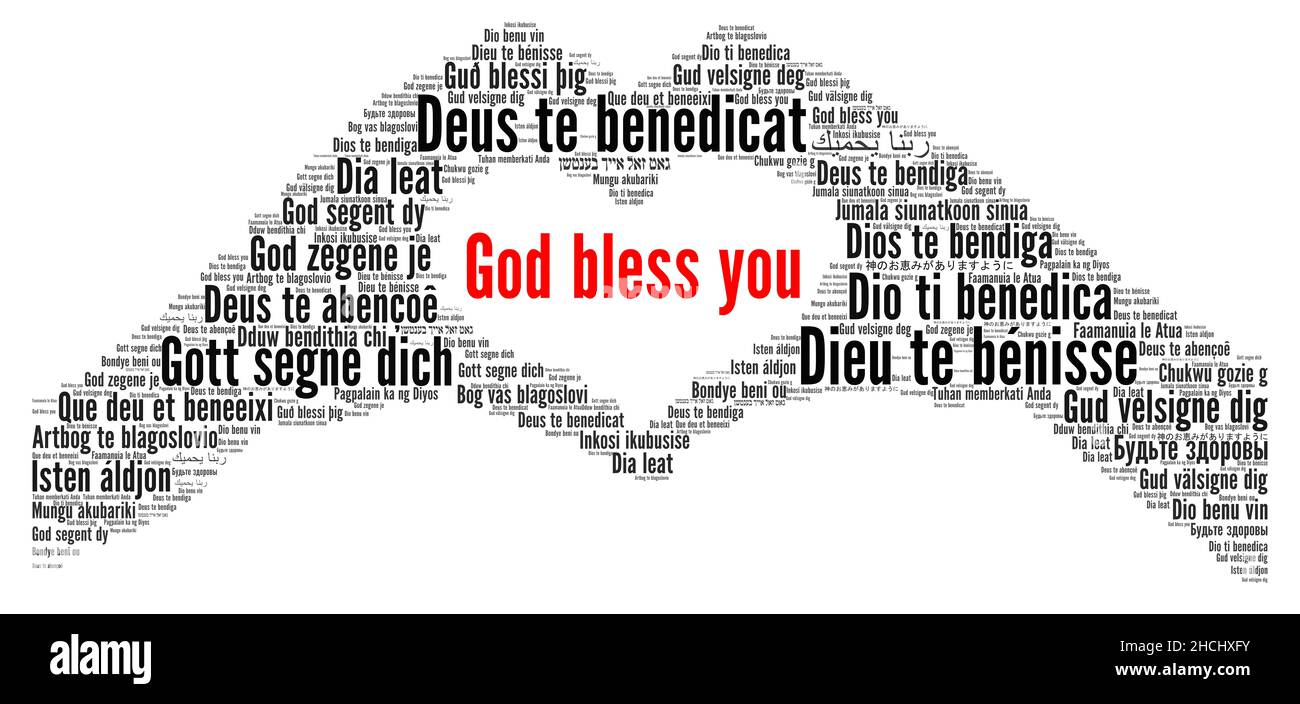God bless you in german language – Embark on a linguistic adventure as we delve into the world of “God bless you” in German. This phrase, steeped in history and cultural significance, holds a unique place in the German language, reflecting values, beliefs, and social norms.
From its origins in religious tradition to its contemporary usage in everyday life, we will explore the nuances and variations of this heartfelt expression. Join us on this journey to uncover the deeper meaning and significance of “God bless you” in German.
Definition and Meaning of “God Bless You” in German
The German translation of “God bless you” is “Gott segne dich.” This phrase is typically used as a blessing or expression of goodwill towards someone who has just sneezed.
The literal meaning of “Gott segne dich” is “May God bless you.” The phrase is a reminder that we are all connected to something greater than ourselves and that we should be grateful for the blessings in our lives.
Cultural Significance
In German culture, it is considered polite to say “Gott segne dich” to someone who has just sneezed. This is a way of showing that you care about the person and that you wish them well.
The phrase “Gott segne dich” can also be used in other contexts, such as when someone is going on a journey or starting a new job. In these cases, the phrase is used to express hope that the person will be safe and successful.
Variations and Contextual Usage
The phrase “God bless you” in German has several variations, each with its own contextual nuances and usage.
The most common variation is “Gott segne dich”, which is used in formal settings and when addressing someone with respect. It is often used in religious contexts, such as during prayers or blessings.
Regional Variations
There are also regional variations of the phrase, such as:
- “Gott behüte dich”(Bavaria, Austria)
- “Gott schütze dich”(Northern Germany)
- “Der Herr sei mit dir”(Southern Germany, Switzerland)
These variations are typically used in informal settings and when speaking to friends or family.
Social Setting
The usage of the phrase “God bless you” can also vary depending on the social setting.
In formal settings, it is considered polite to say “Gott segne dich” when someone sneezes or coughs. In informal settings, it is more common to use a shorter variation, such as “Gesundheit” (health) or “Prosit” (cheers).
Historical and Cultural Origins
The phrase “God bless you” has a rich historical and cultural background in German-speaking countries. Its roots can be traced back to the early days of Christianity, when it was used as a blessing or prayer for protection and well-being.
Over time, the phrase evolved and became more secularized, but it retained its association with good wishes and positive intentions. In German culture, it is commonly used as a way to express concern, sympathy, or gratitude.
Religious Influences
The religious origins of the phrase “God bless you” are evident in its traditional usage. In Christian tradition, it is believed that God has the power to grant blessings, protection, and healing. By saying “God bless you,” people are invoking divine favor and asking for God’s protection and guidance.
Social Influences
In addition to its religious significance, the phrase “God bless you” has also been shaped by social and cultural factors. In German-speaking countries, it is considered a polite and respectful way to express concern or sympathy for someone who is experiencing hardship or difficulty.
The phrase can also be used as a way to show gratitude or appreciation. For example, it is common to say “God bless you” to someone who has done something kind or helpful.
Usage in Modern German
In contemporary German society, the phrase “God bless you” is still widely used, albeit less frequently than in the past. It is commonly employed in formal settings, such as religious services, or to express well wishes and blessings in a polite and respectful manner.
The phrase appears in various forms of media, including literature, film, and social media. In literature, it is often used to convey a sense of piety or reverence, while in film, it may be employed to evoke a sense of nostalgia or sentimentality.
On social media, the phrase is sometimes used as a hashtag or in online discussions related to religion or spirituality.
Frequency and Distribution
The frequency and distribution of the phrase “God bless you” in German vary depending on the context and setting. In religious settings, it is more likely to be used frequently, particularly during prayers, blessings, or sermons. In everyday conversations, it is less common but may still be used to express well wishes or blessings, especially in formal or polite situations.
In media, the phrase is used with varying frequency. In religious-themed literature or films, it may appear more frequently, while in secular contexts, its usage is less common. On social media, the phrase is used sporadically, often in the context of religious discussions or personal expressions of faith.
Comparison with Similar Phrases in Other Languages
In many cultures around the world, there are similar phrases or expressions that convey the sentiment of “God bless you.” These phrases often have a religious or cultural significance and reflect the beliefs and values of the society that uses them.
One of the most common similar phrases is “May God bless you,” which is used in many Christian cultures. This phrase is typically said as a blessing or a prayer for someone’s well-being and protection. In some cultures, it is also used as a way to express gratitude or appreciation.
In Other Languages, God bless you in german language
In other languages, there are similar phrases that convey the same sentiment. For example, in Spanish, the phrase “Que Dios te bendiga” is used to bless someone. In French, the phrase “Que Dieu vous bénisse” is used for the same purpose.
In Arabic, the phrase “Allahumma barik” is used to ask for God’s blessings upon someone.
These phrases are all similar in that they express a wish for someone’s well-being and protection. However, they also have their own unique cultural and religious significance. For example, the Spanish phrase “Que Dios te bendiga” is often used in a religious context, while the French phrase “Que Dieu vous bénisse” is more commonly used in a secular context.
Design a Table Illustrating Variations of the Phrase
The phrase “God bless you” can be expressed in a variety of ways in German. The following table lists some common variations, along with their meanings and examples of usage:
Variations of “God Bless You” in German
| Variation | Meaning | Example |
|---|---|---|
| Gott segne dich | God bless you (formal) | Gott segne dich, mein Kind. (God bless you, my child.) |
| Gott behüte dich | God protect you | Gott behüte dich vor allem Bösen. (God protect you from all evil.) |
| Der Herr sei mit dir | The Lord be with you | Der Herr sei mit dir, mein Bruder. (The Lord be with you, my brother.) |
| Möge Gott dich segnen | May God bless you | Möge Gott dich segnen und beschützen. (May God bless and protect you.) |
| Alles Gute | All the best | Alles Gute zum Geburtstag! (All the best for your birthday!) |
Elaborate on the Cultural Significance of the Phrase

Beyond its literal meaning, the phrase “God bless you” holds deep cultural significance in German society. It reflects German values of politeness, respect, and a belief in a higher power.
The phrase is often used as a polite way to acknowledge a sneeze, cough, or other bodily function that may be considered disruptive or impolite. By saying “God bless you,” the speaker is expressing concern for the well-being of the other person and wishing them good health.
Religious and Cultural Context
The phrase also has religious significance in German culture. Many Germans are Christian, and the phrase “God bless you” is often used as a way to invoke divine protection and blessing. The phrase is also used in a more general sense to express hope for good fortune and happiness.
In addition to its religious and polite connotations, the phrase “God bless you” is also used as a way to express gratitude or appreciation. For example, someone might say “God bless you” to thank someone for their kindness or generosity.
Provide Examples of the Phrase Used in German Literature: God Bless You In German Language

German literature is replete with instances where the phrase “God bless you” is employed, reflecting its deep cultural significance. These examples illustrate the phrase’s diverse usage and the contexts in which it appears.
Goethe’s Faust
In Goethe’s masterpiece, Faust, the phrase is uttered by the protagonist, Faust, as he witnesses the suffering of Gretchen. The utterance reflects Faust’s compassion and his desire for divine intervention to alleviate Gretchen’s pain.
“Gott sei dir gnädig!” rief er aus. “Wie schwer ist’s, dich zu entbehren!”
(“God bless you!” he exclaimed. “How hard it is to miss you!”)
Schiller’s Wilhelm Tell
In Schiller’s play Wilhelm Tell, the phrase is spoken by the title character as he aims his crossbow at the tyrant Gessler. Tell’s utterance expresses his trust in divine providence and his hope for God’s support in his fight against oppression.
“Gott helfe mir!” rief er aus, “nun gilt’s!”
(“God help me!” he exclaimed, “now it’s time!”)
Heinrich Heine’s Buch der Lieder
In Heinrich Heine’s collection of poems, Buch der Lieder, the phrase appears in the poem “Ein Fichtenbaum steht einsam.” The speaker, a lonely pine tree, utters the phrase as a plea for divine comfort and companionship.
“Gott hat ihn nicht gesegnet, er hat ihn nicht geliebt.”
(“God has not blessed him, he has not loved him.”)
Summary

Our exploration of “God bless you” in German has shed light on its rich cultural heritage and multifaceted usage. This phrase serves not only as a blessing but also as a reflection of German values, beliefs, and social norms. As we bid farewell to this topic, let us carry with us a deeper appreciation for the power of language and its ability to convey both the sacred and the mundane.
Questions Often Asked
What is the German translation of “God bless you”?
Gott segne dich.
In what contexts is the phrase commonly used?
The phrase is used in various contexts, including after someone sneezes, as a general expression of well-being, or as a farewell.
What are some variations of the phrase?
Common variations include “Gott behüte dich” (God protect you) and “Der Herr segne dich” (The Lord bless you).